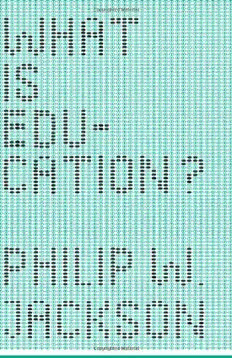Download What Is Education? PDF Free - Full Version
Download What Is Education? by Philip W. Jackson in PDF format completely FREE. No registration required, no payment needed. Get instant access to this valuable resource on PDFdrive.to!
About What Is Education?
One day in 1938, John Dewey addressed a room of professional educators and urged them to take up the task of “finding out just what education is.” Reading this lecture in the late 1940s, Philip W. Jackson took Dewey’s charge to heart and spent the next sixty years contemplating his words. The stimulating result of a lifetime of thinking about educating, What Is Education? is a profound philosophical exploration of how we transmit knowledge in human society and how we think about accomplishing that vital task. Most contemporary approaches to education follow a strictly empirical track, aiming to discover pragmatic solutions for teachers and school administrators. Jackson argues that we need to learn not just how to improve on current practices but also how to think about what education means—in short, we need to answer Dewey by constantly rethinking education from the ground up. Guiding us through the many facets of Dewey’s comments, Jackson also calls on Hegel, Kant, and Paul Tillich to shed light on how a society does, can, and should transmit truth and knowledge to successive generations. Teasing out the implications in these thinkers’ works ultimately leads Jackson to the conclusion that education is at root a moral enterprise. At a time when schools increasingly serve as a battleground for ideological contests, What Is Education? is a stirring call to refocus our minds on what is for Jackson the fundamental goal of education: making students as well as teachers—and therefore everyone—better people.
Detailed Information
| Author: | Philip W. Jackson |
|---|---|
| Publication Year: | 2011 |
| ISBN: | 9780226389387 |
| Pages: | 136 |
| Language: | English |
| File Size: | 0.894 |
| Format: | |
| Price: | FREE |
Safe & Secure Download - No registration required
Why Choose PDFdrive for Your Free What Is Education? Download?
- 100% Free: No hidden fees or subscriptions required for one book every day.
- No Registration: Immediate access is available without creating accounts for one book every day.
- Safe and Secure: Clean downloads without malware or viruses
- Multiple Formats: PDF, MOBI, Mpub,... optimized for all devices
- Educational Resource: Supporting knowledge sharing and learning
Frequently Asked Questions
Is it really free to download What Is Education? PDF?
Yes, on https://PDFdrive.to you can download What Is Education? by Philip W. Jackson completely free. We don't require any payment, subscription, or registration to access this PDF file. For 3 books every day.
How can I read What Is Education? on my mobile device?
After downloading What Is Education? PDF, you can open it with any PDF reader app on your phone or tablet. We recommend using Adobe Acrobat Reader, Apple Books, or Google Play Books for the best reading experience.
Is this the full version of What Is Education??
Yes, this is the complete PDF version of What Is Education? by Philip W. Jackson. You will be able to read the entire content as in the printed version without missing any pages.
Is it legal to download What Is Education? PDF for free?
https://PDFdrive.to provides links to free educational resources available online. We do not store any files on our servers. Please be aware of copyright laws in your country before downloading.
The materials shared are intended for research, educational, and personal use in accordance with fair use principles.

